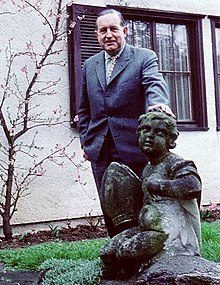Kissed the devil on the bum
| Movie | |
|---|---|
| Original title | Kissed the devil on the bum |
| Country of production | Germany |
| original language | German |
| Publishing year | 1992 |
| length | 89 minutes |
| Age rating | FSK 16 |
| Rod | |
| Director |
Arpad Bondy Margit Knapp |
| script | Margit Knapp |
| production | Arpad Bondy Rainer CM Wagner (SDR editorial team) |
| music | Norbert Schultze |
| camera | Norbert Bunge |
| cut | Arpad Bondy |
| occupation | |
| |
Kissed the devil on the bum , subtitle The astonishing career of the composer of 'Lili Marleen' Norbert Schultze , is a German documentary film by the hand of the musician Arpad Bondy about the composer and film composer Norbert Schultze , who was known for his background music to several Nazi propaganda films and his Composition of the melody to Lili Marleen became famous.
action
“Actually, I never wanted to be a composer. I wanted to be a musician, but to compose? ”This is how Norbert Schultze, born in Braunschweig in 1911, begins to tell his life story in front of the camera. Joseph Goebbels ' most urgent film music writer reported very early on of his limited ambition and that he had always considered himself "mediocre", "upper average". This is followed by the individual stages in his life, on which the 80-year-old old man, sitting on a chair in a barren room, gives comments to a camera. In between, Schultze sat down at the piano every now and then and gave samples of his skills, but also admits that he never developed his own forms, but merely, as he expresses it verbis, being a "professional musician".
His creation of scores, which were used in propagandistic Nazi "documentaries" such as Baptism of Fire (1939/40) and feature films such as Kampfgeschwader Lützow , freed him from military service in World War II (so-called UK position). He owes his macabre, mocking nickname “Bomben-Schultze” to his anti-British propaganda song “Bomben auf Engeland”, which Schultze plays and sings again on the piano in the documentary. His notes on Lili Marleen , written in 1938 - initially a shopkeeper - brought him far beyond Germany's borders and even with the enemy (Great Britain, USA) from 1941, when the song performed by Lale Andersen on Radio Belgrade every evening from 9:57 p.m. as a good night Music for the German soldiers was played on all fronts, a world fame. Schultze performs this evergreen again on the piano in front of the camera. Schultze, who sees himself merely as an “entertainer”, rejects the accusation of having been a “distraction artist” with such work.
Then Schultze tells how Goebbels intervened personally when it came to a slight modification of the propaganda music classic “Vorwärts nach Osten” with the infamous closing line “Führer befiehl, we follow you”. Schultze composed this song on the occasion of the German attack on the Soviet Union. The fact that these compositions enjoyed great popularity in the Reich thanks to a certain catchiness, as Schultze carelessly admits in the film, fills him with a certain pride. To the
At the turn of the year 1944/45, Schultze reached his last professional high point in the Third Reich with a composition that he made under difficult circumstances in Prague (frequent power cuts) for the classic Kolberg . In Berlin, Norbert Schultze saw the end of the war and shortly afterwards, when the Americans got hold of him and learned that he was the Lili Marleen composer, he was asked to compose a march for the US military police, which he finally did also did.
The denazification of Schultze did not go well for the musician, who had believed he would at least be arrested by the Allies in 1945. Schultze (“But I wasn't a Nazi!”) Is far from the fact that he could be called a regime benefactor. When he turned to his uncle, the actor and director Richard Révy, who emigrated to the USA in 1938 , he replied with just a few lines: “Dear Norbert! You kissed the devil on the backside, nobody wipes it off anymore. Your Richard. ”After 1945, Norbert Schultze continued his career in West German post-war film, initially under the harmless film pseudonym“ Peter Kornfeld ”, largely without any personal consequences or breaks. This film ends with Schultze playing the propaganda hit song “Bombs on Engeland” and “Führer befiehl, we follow you” and “Lili Marleen”, again at the piano.
Production notes
Kissed the Devil on the Butt was made during an interview lasting several hours in April 1991 as a commissioned production by Süddeutscher Rundfunk at Schultze's home on Mallorca and Berlin . The film was first broadcast on ARD in 1993 and also released in cinemas on May 12, 1994.
Actor Christian Berkel acted as off-speaker .
reception
The film service says: “The psychogram of a fellow traveler who is not conscious of any guilt has seldom been drafted so succinctly. For nine days, the filmmakers interviewed the composer, who composed "Lili Marleen", among other things, in a white room without history. He chats happily about his career, which was only made possible by the exodus of Jewish musicians. There is consciously no explicit moral condemnation; the 80-year-old exposes himself, but also a society that quickly forgets. "
Individual evidence
- ↑ Kissed the devil on the bum. In: Lexicon of International Films . Film service , accessed July 1, 2020 .
Web links
- whole film on youtube
- Kissed the devil on the bum on basisfilm.de
- Kissed the devil on the bum in the movie rating office
- The devil kissed the butt in the Internet Movie Database (English)
- Kissed the devil on the butt at filmportal.de

